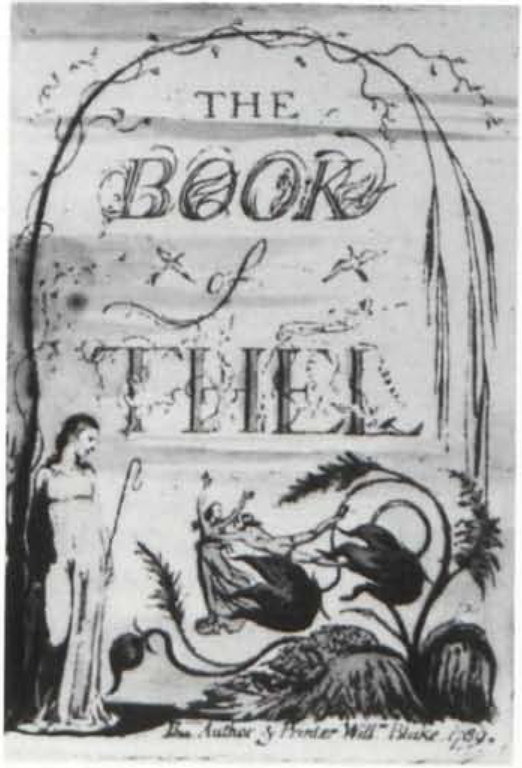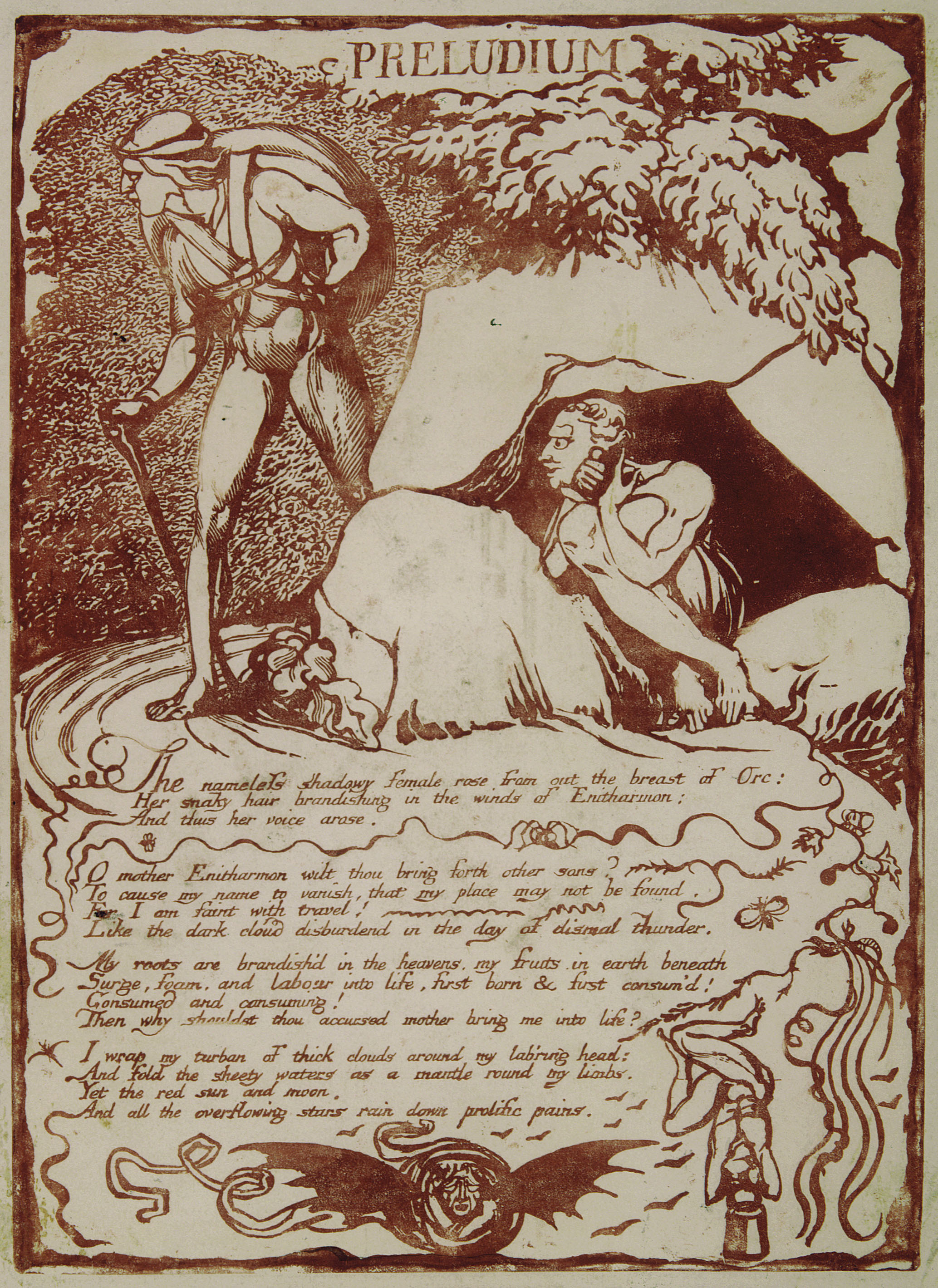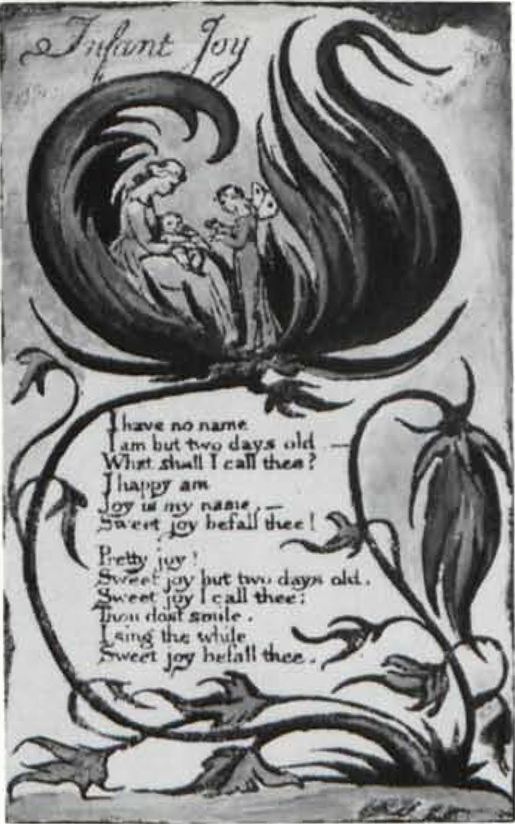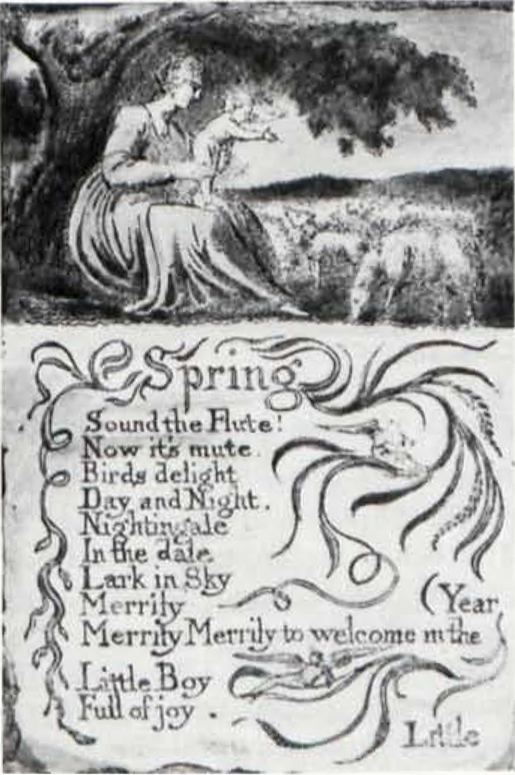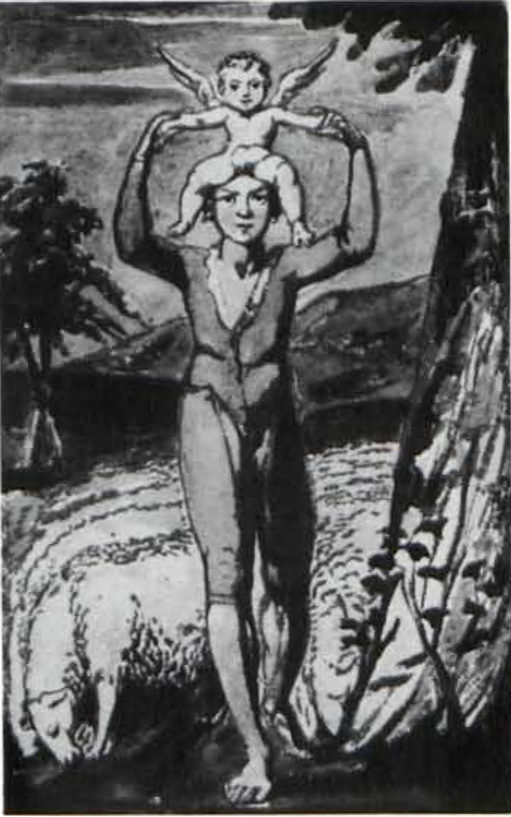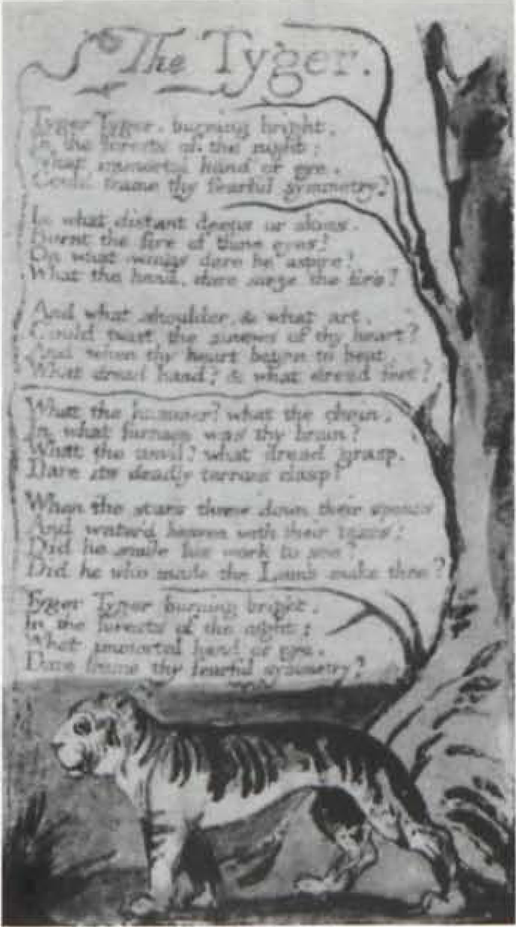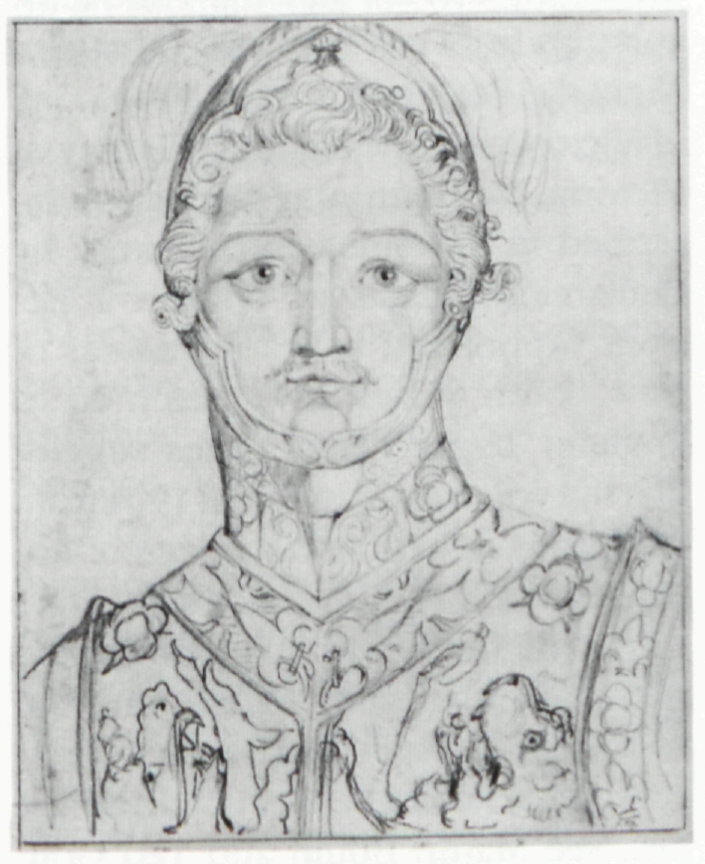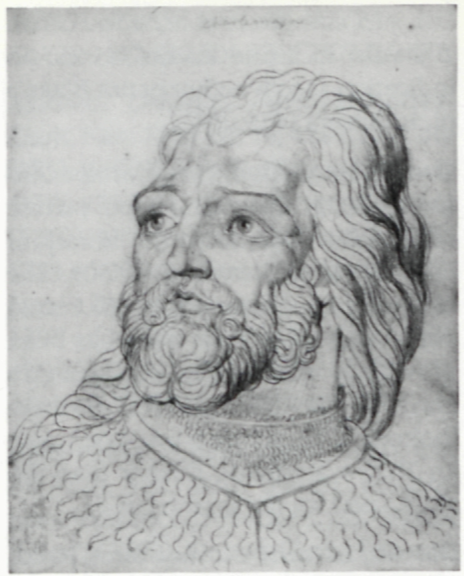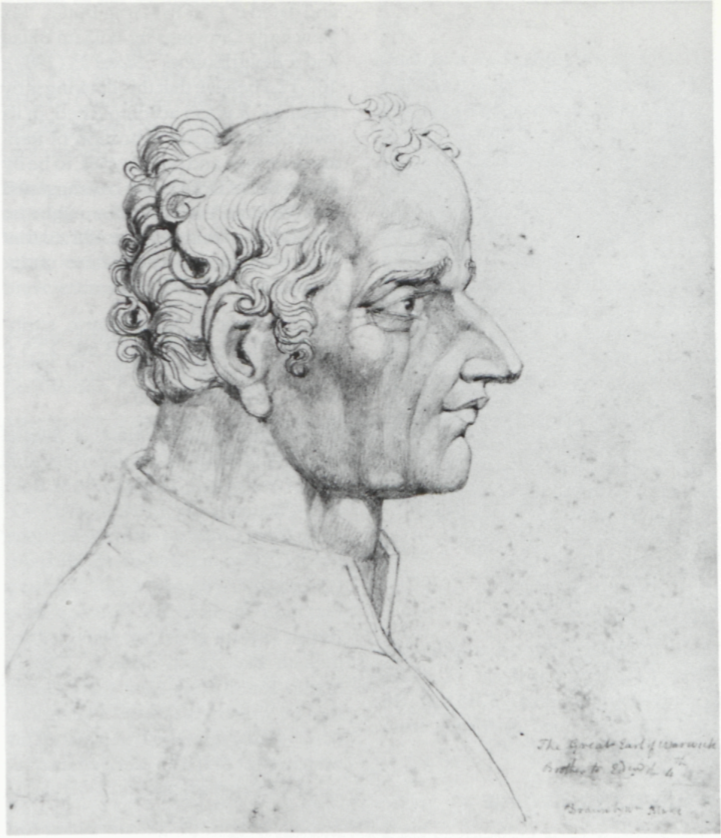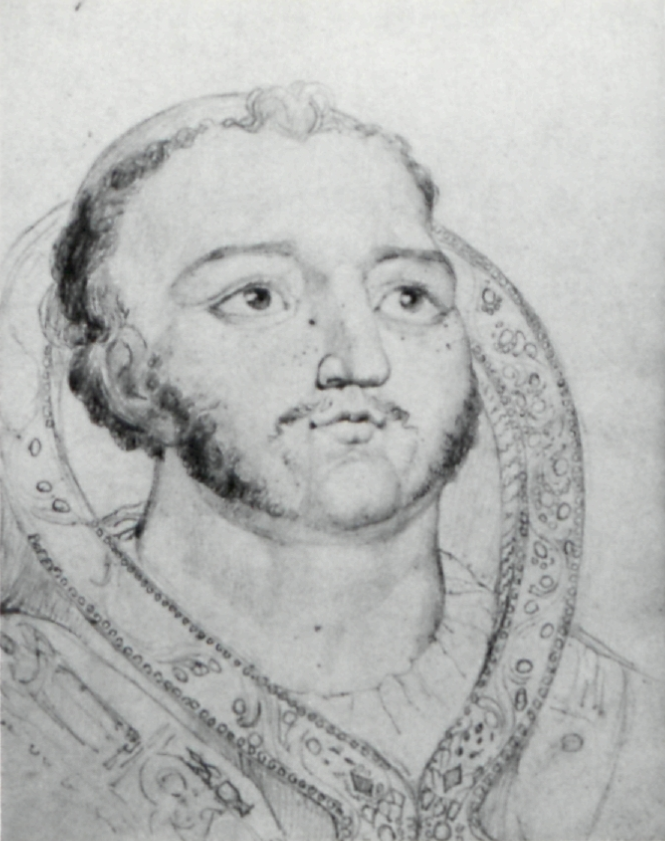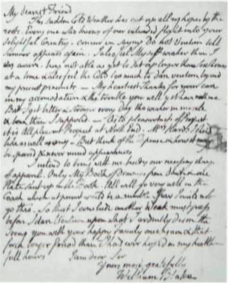article
begin page 220 | ↑ back to topBlake in the Marketplace, 1989, Including a Report on the Recently Discovered Blake-Varley Sketchbook
The Blake market roared ahead at a high level of activity throughout 1989. More illuminated books were sold than in any year since 1958, some stratospheric price records were set, and an important notebook of drawings was discovered. Three auctions and one private sale deserve particular attention.
The long-awaited sale of Blakes from the Edward Laurence Doheny Memorial Library finally arrived in Christie’s New York rooms on 21 February. The first Blake to be offered, copy N of Songs of Innocence (illus. 3-6), was quickly pushed by several bidders well beyond the estimate range of $80,000-100,000 printed in the catalogue. Action slowed in the neighborhood of $225,000, and then battle resumed between just two combatants, the New York (formerly London) dealer Donald A. Heald and the London dealer Libby Howie (acting for an American private collector). The latter made the winning bid of $300,000 (not including the 10% purchaser’s premium). This is about the same amount fetched by the entire Graham Robertson collection of Blake’s drawings and water colors sold in 90 lots in 1949.
Stephen Massey, head of Christie’s Book Department and the auctioneer for this sale, proceeded through five unspectacular Blake lots to reach a remarkable set of the Dante engravings, printed directly on laid paper rather than the usual India paper backed by wove. Heald bought these foxed but very fine impressions at $55,000 “hammer price” (i.e., the actual amount bid, not including the buyer’s premium), thereby setting a new
The last Blake lot was Infant Jesus Saying His Prayers (illus. 15), estimated at $50,000-100,000. Although somewhat faded in the yellows and blues, and with pigment (lead?) decay in the darker colors at the top, this was still the finest Blake water color to be offered for sale since 1973, when Paul Mellon bought The Magdalene at the Sepulchre at Christie’s in London for £23,100. Bidding was exceptionally spirited, with participation from several art dealers as well as booksellers. As the price zoomed above $200,000 and the audience murmured in surprise, it became difficult to determine who was still in the hunt. The final two bids seemed to be either on the telephone or “at the desk” (i.e., handled by Christie’s for a client), but the water color fell at $320,000 to the same American collector who had purchased the Songs of Innocence a few minutes earlier. Both works join America copy R (see Blake 21 [1988]: 138-42), a hand-colored copy of Little Tom the Sailor, and several leaves from illuminated books in what is now arguably one of the two finest (although certainly not the largest) Blake collections in private hands. The collector insists on anonymity.
The price realized by Infant Jesus set a new record for a Blake water color and for any work by him sold at auction. Of more significance is the fact that this water color fetched more than the Songs of Innocence in the same sale. Clearly, the art world is waking up to Blake. Proceeds from the sale of the Doheny Library will be used by the Catholic Archdiocese of Los Angeles for the recruitment and training of priests.
begin page 221 | ↑ back to topAt a time unknown to me, late in 1988 or early in 1989, a gentleman brought to the Drawings Department at Christie’s in London a shabby notebook of 68 leaves, 25.4 × 20.3 cm., some with an 1804 watermark. The first 18 leaves bear landscape and architectural drawings by John Varley. But suddenly, beginning with the verso of a leaf numbered 18, Christie’s drawing expert came upon a series of stunning Visionary Heads by Blake (illus. 10-14). There are 52 leaves of drawings by Blake, a few with more than one portrait, plus 4 counterproofs of other Visionary Heads. (A counterproof of a pencil drawing is made by placing it face down against a dampened sheet of paper and rubbing or applying pressure to the back of the drawing. Graphite is transferred to the dampened sheet to create a reversed copy of the original.) All the drawings are in pencil, with the larger portraits worked up in considerable physiognomic detail, some heightened with black chalk. Most of the drawings bear brief inscriptions, apparently by Varley, identifying the characters. Varley foliated all the leaves consecutively on the top right corner of their rectos and used the book for his own drawings on a sketching tour in 1808, as the date inscribed on the first leaf indicates. In October 1819, the date inscribed on leaves 83 and 89, Varley lent the sketchbook to Blake, who turned it upside down and began to fill the leaves with his own drawings, working back to front, mostly on versos.
Christie’s, believing they had been brought a considerable treasure for sale, devoted an entire catalogue to the sketchbook, with reproductions of all but one of Blake’s drawings (leaf 25 recto—see the list below). No estimate was printed in the catalogue, but upon inquiry one was told that the auction house expected the book to fetch half a million pounds. At the sale on 21 March, there was not a single bid in the room. As is customary in such situations, the house ran up the asking bids to a respectable buy-in price—a practice often called “bouncing it off the wall.” At some time after the sale, a consortium of three dealers, including two Americans, made a substantial offer, eagerly accepted by Christie’s and the sketchbook’s owner. Upon application for an export license, the government put a 4 month hold on the sale. During that time, any British institution could acquire the sketchbook by meeting the selling price. The British Museum had expressed interest, but it could not raise sufficient funds, and the consortium fell asunder in January 1990. The sketchbook remains on deposit at Christie’s, but will be in the Blake Exhibition at the National Museum of Western Art, Tokyo, in September 1990. The fact that several leaves bearing Blake’s drawings were removed from the sketchbook early in its history might provide an excuse for breaking it up and selling each leaf individually. This was the fate of the previously known
Although I have not seen this new and “larger” Blake-Varley sketchbook (the smaller book has leaves measuring 15.5 × 20.5 cm.), the very thorough auction catalogue and information supplied by David Bindman allow me to make this preliminary report. I list below, in the probable order of their execution, all of Blake’s drawings. The leaf numbers follow Varley’s enumeration, and thus run in reverse. All quotations are of Varley’s inscriptions in the sketchbook unless noted otherwise. Drawings that were once in this sketchbook and other Visionary Heads of the same or related characters are referred to by Butlin numbers.
89 recto. A draft of Varley’s list of Visionary Heads (see 85 verso) with a slight sketch of a head, “possibly Varley by Blake” (according to the auction catalogue). This portrait is not part of the main sequence. Not the same head as Butlin #689.
88-86. Missing. Perhaps with portraits, removed for counterproofing.
85 verso. “List of Portraits Drawn by Wm Blake from visions / which appeard to him & Remaind. while he completed them / Some of which are in other Books[.]” In Varley’s hand. The “other Books” would presumably include the smaller Blake-Varley sketchbook, but could also include the “large book filled with drawings” of Visionary Heads that Allan Cunningham was shown by Varley (Cunningham, The Lives of the Most Eminent British Painters, Sculptors, and Architects, 2nd ed. [London: Murray, 1830] 172). This group, perhaps of loose drawings inserted in a folder, included Pindar, Lais, and the “task-master whom Moses slew,” and thus cannot be identified with either extant sketchbook.
84. Missing. Perhaps this leaf bore a portrait, like others removed for counterproofing.
83 recto. “Cassibelane the British Chief,” cut out and pasted to the stub of leaf 82. Same images as Butlin #716 (a strengthened counterproof from this drawing?). Cassivellanus, chief of the Catuvellani, resisted Julius Caesar’s invasion of Britain in 54 B.C.
82. Missing; possibly Butlin #716 (see 83 recto).
begin page 222 | ↑ back to top81 verso. Counterproof of Cassibelane from 83 recto, strengthened by another hand (Varley?).
80 verso. Blank—see 69.
80 recto. “Merlin,” counterproof of Butlin #757 (therein provisionally identified as “A Welsh Bard, Job or Moses?”).
79-72. Missing. These leaves included Butlin #722 (“Canute,” a strengthened counterproof, still bearing Varley’s leaf number “77” upside down on the reverse), probably its untraced original, and perhaps Butlin #731-33 (King John, 1167-1216, and two counterproofs).
71. Blank.
70. Removed. The counterproof (Butlin #725) of 69, still bearing Varley’s leaf number upside down on the reverse.
69. “Empress Maud,” also known as Matilda (1102-67), daughter of Henry I and wife of Emperor Henry V. Removed and attached to leaf 80 verso. Three full-length drawings in the smaller sketchbook show Maud standing in a gothic apse, in bed, and without surrounding motifs (Butlin #692.23, 25, 27).
68. Removed. Counterproof (Butlin #741) of 67, still bearing Varley’s leaf number upside down on the reverse.
67 verso, loose but present. “Wat Tylers Daughter / Striving to get loose from the Tax gatherer.” Face and shoulders of the daughter only; see also 65.
66. Removed. Counterproof (Butlin #737) of 65, still bearing Varley’s leaf number upside down on the reverse.
65. “Wat Tyler / in the act of striking the Tax Gatherer.” Tyler’s grimacing face only, with two details of his mouth. Removed and attached to the stub of leaf 70. The subjects of this and 67 verso may have been influenced by Fuseli’s design, showing Wat Tyler, his fleeing daughter, and the fallen tax-gatherer, engraved by Blake for Charles Allen, A New and Improved History of England, 1798. This legendary incident resulted from a confusion between Wat Tyler, who with Jack Straw rebelled against Richard II, and John Tyler, a blacksmith who killed a tax-gatherer for attacking his daughter.
64 and 63. Removed.
62. Removed. Counterproof (Butlin #730) of 61, still bearing Varley’s leaf number upside down on the reverse.
61 verso. “The Bastard Faulconberg”—either the illegitimate son of Richard I, or the Earl of Kent, natural son of Sir William Neville. There are two profiles and a standing figure of Faulconberg in the smaller sketchbook (Butlin #692.38, 57).
60 verso. “Hotspur” (Sir Henry Percy, 1364-1403). Butlin #745 is probably a strengthened counterproof of this original. Varley inscribed “Hotspur . . .” on a page in the smaller sketchbook (Butlin #692.53), but this does not seem to be related to the two figures (one winged, one with a halo) roughly sketched above. Hotspur is also mentioned in Varley’s notes near the end of the smaller book (Butlin #692.131).
59 verso. “[Al, deleted] Owen Glendower” (1359?-1416?), leader of the Welsh rebellion against Henry IV. Butlin #743-44 are probably counterproofs of this original. The fragmentary “Al” may be the beginning of “Alexander”—see 58 verso.
58 verso. “Alexander the Great.” Butlin #698 may be a counterproof, inscribed (by John Linnell?) “David.” See also 21 verso.
57 verso (illus. 10). “Henry the 5th” (1387-1422).
56 verso. “the Black Prince” (Edward, Prince of Wales, 1330-76). For an earlier portrayal, c. 1793, see Edward III Presenting the Black Prince to the Barons (Butlin #66).
55 verso. “Robin Hood.”
54 verso. “Pharoah who knew Joseph.” For Blake’s designs based on the story of Joseph, exhibited in 1785, see Butlin #155-57.
53 verso. “Josephs Mistress.” This profile is similar to the wife’s in Blake’s water color of c. 1803-05, Joseph and Potiphar’s Wife (Butlin #439).
52 verso. “Perkin Warbeck” (1474-99, pretender to the throne of Henry VII).
51 verso. “Vortigern” (betrayer of the British cause, c. 450, out of love for Rowena—see 49-50 verso).
50 verso (illus. 11). “Rowenna” (see 51 verso).
49 verso. “Rowenna” (basically the same portrait as 50 verso, but showing the woman’s breasts).
48 verso. “Felton the assassinator[e] / of the Duke of Buckingham” (John Felton, 1595?-1628).
47 verso. “Milton when a Boy” (John Milton, 1608-74). Probably influenced by Cornelius
46 verso. “Milton when young.” A much fuller face than Cipriani’s engraving in Hollis (see 47 verso) showing Milton at about the same age. For an older, blind Milton, see Blake’s tempera in his “Heads of the Poets” series of c. 1800-03 (Butlin #343.11). There is a portrait of Milton’s first wife in the smaller Blake-Varley sketchbook (Butlin #692.96), sold 14 Nov. 1989 to Christopher Powney.
45 verso (illus. 12). “Charlemagne” (first Holy Roman Emperor).
44 verso. “Miltons youngest daughter.”
43 verso. “Miltons elder [inserted above] daughter.”
begin page 223 | ↑ back to top42 verso. “Bertand de Gourdon who wounded / Richard Coeur de Lion with an Arrow.”
41 verso. “The Captain to Richard the first / who Flayd Bertand de Gourdon alive.” For the Visionary Head of Richard I, see Butlin #729.
40 verso. “Jack Shepherd / under the Gallows.” The gallows are not pictured. John Shepherd (1702-24) escaped hanging twice but was not so lucky the third time.
39 verso. “Colonel Blood who attempted / to Steal the Crown.” Thomas Blood (1618?-80) was pardoned by Charles II for his crime.
38 verso (illus. 13). “The Great Earl of Warwick / Brother to Edwd. the 4th / Drawn by Wm Blake.” Richard Neville, “The Kingmaker,” 1428-71.
37 verso. “Queen Isabella wife to Edwd the 2d. & mother to Edwd the 3d.” Queen Isabella of France (1292-1358) married Edward II in 1308 and deposed him in favor of her son in 1327.
36 verso. “Robert Bruce King of Scotland.” Bruce (1274-1329) was crowned King of the Scots in 1306.
35 verso. “Geofrey of Monmouth” (1100-54, author of the Historia Britonum).
34 verso. “Ossian” (the legendary Gaelic bard made famous by James Macpherson’s “translations”). Blake comments approvingly on Macpherson and Ossian in his 1826 annotations to Wordsworth’s Poems (see The Complete Poetry and Prose of William Blake, ed. David V. Erdman, rev. ed. [Berkeley: U of California Press, 1982] 665-66).
34 recto. A continuation of the landscape on 33 verso.
33 verso. “Ossian” (see 34 verso), full length, with his harp and standing on a hill before an enormous tree, mountains in the background.
32 verso. Sketches of 7 heads, inscribed “Mother / Brownrigg” (murderess, hanged 1767), “Miss Blandy / who poisoned / her father” (hanged 1752), “Pope Joan” (the mythical female Pope of the 9th century), “Cornelius Agrippa” (occult philosopher, 1486-1535), “Eloisa” (Abelard’s beloved, died 1164), “Abelard” (theologian, 1079-1142), “Countess of Essex who / Poisoned Overbury” (Sir Thomas Overbury the poet, 1581-1613). A face very similar to Brownrigg’s appears in the smaller sketchbook (Butlin #692.72, “perhaps by Blake”); Mary Blandy’s features resemble Queen Isabella’s (37 verso).
31 verso. “Catherine Hayes / Burnt for the Murder / of her Husband” in 1736.
31 recto. A bishop’s mitre, no doubt linked to the bare-headed bishop on 30 verso.
30 verso (illus. 14). An archbishop, possibly Thomas à Becket, murdered in 1170 (see 29 verso).
29 verso. “a Becket Preaching,” full length with mitre and crozier standing on a gothic pulpit. With another standing figure, holding a book; a baby’s head; three fragments of gothic ornament (details for the archbishop’s costume or pulpit); head of an old man; 2 heads of women; and a figure standing in a gothic niche, perhaps a detail for one of the 5 (carved?) figures in niches on the pulpit.
28 verso. “Mary Queen of Scots” (1542-87).
28 recto. A continuation of the battlements on 27 verso.
27 verso. “Bothwell” (James Hepburn, 4th Earl of Bothwell, 1536-78, and Queen Mary’s husband—see 28 verso). Behind this bust are some battlements.
26 verso. “Tom Nixon the Idiot / the author of several Prophecies.” Robert (or “Tom”) Nixon, the seventeenth-century prophet of Cheshire.
25 verso. “Pisistratus” (561-27 B.C.), the tyrant of Athens.
25 recto. Sketches for the throne of Pisistratus on 24 verso.
24 verso. “Pisistratus” (see 25 verso) seated on a monumental throne, apparently constructed of stone blocks.
24 recto. A prisoner in profile, with a chain descending from his right wrist, standing between two guards in classical garb and holding spears. Perhaps related to the Pisistratus drawings, leaves 24-25.
23 verso. “a daughter of Shakespeare” (either Susanna, born 1583, or Judith, 1585-1662). See also 20 verso.
22 verso. “Xantippe / wife of Socrates.” Blake sketched two visionary heads of Xanthippe’s husband, Butlin #713-14.
21 verso. “Olympia.” Perhaps Olympias, mother of Alexander the Great (see 58 verso).
20 verso. “Shakespeare’s Wife” (Anne Hathaway, 1556-1623). See also 23 verso.
19 verso. “Savage the Poet” (Richard Savage, died 1743, was found guilty of murder in 1727 but was pardoned), and two counterproofs of a young man in profile (the original untraced).
18 verso. “Sir Robert Lucy. Shakespeares Persecutor.” Lucy (1532-1600), who may have prosecuted Shakespeare for poaching c. 1585, has been suggested as the model for Justice Shallow in Henry IV, Part II.
Even this bare list of subjects encourages a little speculation. The principle of order lurking behind the potpourri of sketches is taxonomic and categorical, not chronological, as one would expect on the basis of Varley’s physiognomic predilections (and perhaps Blake’s). Several clusters of character types emerge, although none runs as an uninterrupted sequence. For the student of Blake’s poetry, perhaps the most interesting group is the poets and other visionaries: Merlin, Ossian, Cornelius begin page 224 | ↑ back to top
The small-scale killers, generally executed for their efforts, lead us to military leaders (large-scale killers honored for their efforts), and then to a class of paired opposites: assassins, traitors, and rebels vs. monarchs of church and state. Were Blake and Varley searching for connections between victim and victimizer, rebel and tyrant, signified in their visages? Physiognomy must have played a major role in leading the two artists to the mothers, wives, and children of famous men—the daughters of Milton and Shakespeare, the latter’s wife, the mother of Alexander the Great. But some of these family pairs can also remind us of Blake’s Zoas and their Emanations, a system of union and differentiation not incompatible with physiognomic paradigms. Similarly, the murderesses and characters such as Pope Joan and Isabella of France recall Blake’s declarations against the Female Will. For other thoughts on the contents of the sketchbook, see David Bindman’s essay in Christie’s International Magazine 6 (March-April 1989): 2-4.
The relationship between the new sketchbook and other Visionary Heads bears consideration. The unsigned introductory essay in Christie’s March 1989 auction catalogue suggests that drawings sketched during seance-like sessions at night in the smaller book were transferred to the larger for finishing, but I can find no convincing evidence for this as a regular practice. The only character who appears as a facial portrait in both sketchbooks, Faulconberg, is recognizably the same person, but he is pictured in profile in the smaller book and in three-quarter perspective in the larger. The smaller book is certainly in a lesser state of finish, but its larger companion seems also to have been used for primary sketches. Many of these were subsequently worked up with pencil and black chalk, while the latter was never used in the smaller sketchbook. The next stage was to remove leaves for counterproofing, but this progressed in the larger book only through the first twenty or so leaves used by Blake. It must be remembered that the entire project was a corporate activity involving three professional artists of considerable ability—Blake, Varley, and John Linnell (at least in later stages of production). The second and third may have had a hand in the black-chalk additions on some sketches.
The discovery of the larger sketchbook allows us to disentangle the provenance of the smaller. The artist William Mulready, a close friend of both Varley and Linnell, sold at Christie’s on 28 April 1864, lot 86, “a volume containing 49 heads in pencil, from visions which appeared to Blake . . .; at the other end of the book are 16 landscapes by Varley” (£5.5s. to “Kempton”). In a note to Frederic George Stephens, c. 1872, Samuel Palmer refers to the sale of this “volume containing fortynine heads in pencil from visions which appeared to Blake” (untraced, but printed in Stephens, Memorials of William Mulready [London: Sampson Low, 1890] 41). Having no other candidates to fit these descriptions, Butlin took them to be rather inaccurate references to the smaller sketchbook, even though it contains more than 16 sketches by Varley. As presently constituted, the smaller book includes only 21 “heads” by Blake, and it is difficult to conceive how the missing leaves could contain another 28. We can now identify Mulready’s volume as the larger sketchbook, for it has 16 drawings by Varley and 49 by Blake (if we count only the major “heads”). This second number is doubly significant, for it supports the supposition that all the missing leaves were removed prior to 1864 for counterproofing. The smaller book apparently passed from Varley to his friend William Christian Selle, then to Selle’s daughter who married H. Buxton Forman, who gave the sketchbook to William Bell Scott in 1870. After its sale in 1864, the larger volume passed by inheritance to the man who still owns it, in spite of Christie’s best efforts.
begin page 225 | ↑ back to topWho would have thought that the records set at the Doheny sale would last only eight months? On 9 and 10 November, Sotheby’s New York sold in 308 lots a collection of fine books and manuscripts, the property of “The Garden Ltd.” This collection had been formed in recent years by Haven O’More, an admirer of Blake and of Sir Geoffrey Keynes, and for a brief spell an Associate Trustee of the Blake Trust. The catalogue will itself become a collector’s item, both for its many fine illustrations and for O’More’s literary contributions—a prefatory essay “On the Mystery of the Book” and an autobiographical note couched in the third person. Both are glorious compounds of ersatz mysticism and soaring egotism. The catalogue ends with a modest note that someone named “Michael Davis” provided “the funding for The Garden’s Collection” and was its sole owner.
Copy D of Songs of Innocence and of Experience (illus. 7-9) was the first
The room, suffering from sticker-shock, paid little attention to the next lot, copy A of The Book of Thel (illus. 1), one of only two remaining in private hands. The book fell to Donald Heald, acting for a private client, at a mere $130,000 on an estimate of $70,000-100,000. At that point, a Sotheby’s employee claimed that she had been distracted by the hubbub over the Songs and had failed to bid, as instructed, for a client. In spite of Heald’s protests, bidding was resumed, and the lot fell at $145,000 to Sotheby’s client. I have not yet been able to discover this collector’s identity. As a minor-league epilogue, the Blake lots ended with two posthumouslyprinted plates from Europe (to Heald for Essick—see illus. 2) and a set of the Dante engravings (also to Heald).
Edwin Wolf 2nd is known to Blake enthusiasts principally as the coauthor, with Geoffrey Keynes, of the Census of Blake’s illuminated books published by the Grolier Club in 1953. But Wolf is also a discriminating collector who built a fine working library of Blake editions, criticism, and books containing Blake’s commercial engravings. This last category included copies of the 1825 and 1826 issues of Remember Me!, both considerable rarities. Wolf sold his collection of some 350 books and offprints to an American dealer early in 1989. In June 1990 the collection was available from James Burmester and another British dealer acting in partnership.
The year of all sales and catalogues in the following lists is 1989 unless indicated otherwise. The auction houses add their purchaser’s surcharge to the hammer price in their price lists. These net amounts are given here, following the official price lists. Late 1989 sales will be covered in the 1990 review. Copy designations and plate numbers for the illuminated books follow G. E. Bentley, Jr., Blake Books (Oxford: Clarendon Press, 1977). I am grateful for help in compiling this review to David Bindman, Martin Butlin, Scot Campbell of Hindman Auctioneers, Chris Coover and Stephen Massey of Christie’s, William Dailey, Jay Dillon of Sotheby’s, Detlef Dörrbecker, Paul Grinke of Quaritch, Donald Heald, Justin Schiller, David Weinglass, and especially Thomas V. Lange.
ABBREVIATIONS
| BBA | Bloomsbury Book Auctions, London |
| Butlin | Martin Butlin, The Paintings and Drawings of William Blake, 2 vols. (New Haven: Yale UP, 1981) |
| cat. | catalogue or sales list issued by a dealer (usually followed by a number or letter designation) or auction house (followed by the day and month of sale) |
| CL | Christie’s, London |
| CNY | Christie’s, New York |
| illus. | the item or part thereof is reproduced in the catalogue |
| pl(s). | plate(s) |
| SL | Sotheby’s, London |
| SNY | Sotheby’s, New York |
| st. | state of an engraving, etching, or lithograph |
| Swann | Swann Galleries, auctioneers, New York |
| # | auction lot or catalogue item number |
ILLUMINATED BOOKS
The Book of Thel, copy A. 8 pls. on 8 leaves, printed in golden-brown, 6 pls. delicately hand colored. Unbound, matted, in a modern morocco folding case. SNY, 10 Nov., #166, title page illus. color ($159,500 to a Sotheby’s employee acting for a client). See illus. 1.
Europe, pls. 4 and 5 only on 2 leaves from posthumous copy c. SNY, 10 Nov., #167, both pls. illus. color ($17,600 to D. Heald for R. Essick on an estimate of $5000-8000). See illus. 2.
“Night,” pl. 1, from Songs of Innocence. Clipping of the final 9 lines of text and lower design only, 3.1 × 6.4 cm., printed in brown and hand colored in blue, green, and rose, with outlining and shading in dark brown. Verso, lower design only from “Night” pl. 2, hand colored and outlined as on the recto. Acquired April from David Bindman by R. Essick. Both sides illus. color, Lott & Gerrish, June 1986 cat., p. 2.
Songs of Innocence, copy N. 27 pls. on 27 leaves, printed in dark brown and hand colored. CNY, 21 Feb., #1706, title page and “The Lamb” illus. color ($330,000 to the London dealer Libby Howie acting for an American private collector). See illus. 3-6.
Songs of Innocence and of Experience, copy BB. 55 pls. on 55 leaves, printed in black and hand tinted in black and gray washes. Now (June 1990) the property of Randolph Schlegl, Ltd., but available for sale.
Songs of Innocence and of Experience, copy D. 54 pls. on 30 leaves, printed in 2 shades of brown, touches of color printing, hand colored. Bound in contemporary morocco with two flyleaves watermarked 1796. SNY, 10 Nov., #165, general title page, frontispiece to Innocence, and “The Tyger” illus. color ($1,320,000). The cat. description incorrectly claims that this copy contains “A Divine Image,” apparently as a result of confusing that pl. begin page 227 | ↑ back to top with the tailpiece to the Songs, which is present. See illus. 7-9.
DRAWINGS AND PAINTINGS
The larger Blake-Varley sketchbook of 1819. CL, 21 March, only lot (numbered 184), 62 leaves illus. (not sold). See the introductory list of contents, discussion, and illus. 10-14.
Complaint of Job (recto), Standing Figure (verso). Pen and India ink, c. 1785, recto 33.2 × 47.1 cm. Butlin #163. This drawing, untraced since 1928, came into the possession of Thomas Gibson Fine Art Ltd., summer 1989, which sold it to a California private collector (not I, alas). Recto and verso illus. and described in Martin Butlin, “Six New Early Drawings by William Blake and a Reattribution,” Blake 23 (1989): 107-12.
Head of a King in Profile. Pencil, 8 × 6 ½ in., from the smaller Blake-Varley sketchbook. Butlin #692.88. CL, 14 Nov., #154, illus. (£1210 to Christopher Powney). Butlin suggests that this drawing may represent “King John,” but the auction cat. notes that it is indistinctly inscribed by Varley, “Robert” or “Richard.”
Infant Jesus Saying His Prayers. Water color, Butlin #473. CNY, 21 Feb., #1716, illus. color ($352,000 on an estimate of $50,000-100,000 to a dealer bidding on behalf of an American private collector). See illus. 15.
Milton’s First Wife. Pencil, 8 × 6 ⅛ in., from the smaller Blake-Varley sketchbook. Butlin #692.96. CL, 14 Nov., #153, illus. (£1650 to Christopher Powney).
Moses with the Tablets of the Law. Pencil, 20.8 × 14.6 cm., c. 1780-85. Not in Butlin. Agnew’s, Sept. private offer (£11,000). For illus., see Martin Butlin, “Six New Early Drawings by William Blake and a Reattribution,” Blake 23 (1989): 107-12.
Queen Constance and Her Son. Pen and ink with wash, 20.9 × 24.9 cm., c. 1785, pencil sketch of a foot on verso. Butlin #151. Spencer A. Samuels & Co., Feb. private offer ($45,000). Previously sold CL, 10 July 1984, #85, illus. (Spink & Son, £3780). For illus. of recto and verso, see Blake 19 (1985): 29.
A Richly Attired Prince, Perhaps Edward VI. Pencil, 8 × 6 ⅛ in., from the smaller Blake-Varley sketchbook. Butlin #692.108. CL, 14 Nov., #151, illus. (£11,000 to an anonymous bidder on the telephone).
A Royal Couple (verso) and Detailed Drawings (by Blake and Varley?) for the Man Who Built the Pyramids (recto). Pencil, 8 × 6 ⅛ in., from the smaller Blake-Varley sketchbook. Butlin #692.103-04. CL, 14 Nov., #152, verso illus. (£6050 to Christopher Powney).
St. Paul Shaking Off the Viper. Water color, 39 × 30 cm., Butlin #509. Sold c. 1987 by Barry Friedman, Ltd., to another New York dealer, who sold it c. 1988 to a private New York collector.
A Vision: The Inspiration of the Poet. Grey washes over pencil, 17.1 × 17.8 cm., c. 1819-20(?). Butlin #756. Acquired late 1989 by the Tate Gallery, London, from David C. Preston. For illus., see Blake 23 (spring 1990): cover and p. 213.
MANUSCRIPTS
Letter by Blake to John Linnell, Postmarked 2 July 1826. 1 p., tear on right side. CNY, 21 Feb., #1715, illus. ($22,000 to an American private collector). See illus. 16.
SEPARATE PLATES & PLATES IN SERIES, INCLUDING PLATES EXTRACTED FROM LETTERPRESS BOOKS
“Beggar’s Opera, Act III,” after Hogarth. Christopher Mendez, Sept. private offer, 4th st., cut to platemark, washed, lower right corner repaired (£300). Sanders, Sept. private offer, 7th st. (£50). This plate is usually described as existing in 4 or 5 states, but there are at least 9.
“Chaucers Canterbury Pilgrims.” Leslie Hindman auction, Chicago, 14 May, #302, illus. ($5500 to a California collector/dealer who gave it to the National Museum of Western Art, Tokyo).
Dante engravings. CNY, 21 Feb., #1713, 7 pls. complete, very fine impressions on laid paper, probably pulled before the first recorded printing on India of 1838, foxed, 1 pl. illus. (D. Heald, $60,500). Jeremy Norman & Co., May cat. 19, #110, the deluxe issue of the Blake Trust Dante facsimile, 1978, with a modern restrike of pl. 5 ($1500). SL, 27 June, #226, complete set on laid India, 1 support sheet with a “J. Whatman Turkey Mill watermark,” pl. 2 foxed, “otherwise in excellent fresh and unhandled condition,” 2 pls. illus., sold the “Property of a Member of the Linnell Family” (£38,500). CL, 29 June, #13, pls. 1-3, 5-7 only, pl. 1 on laid India, the remainder printed directly begin page 228 | ↑ back to top
“Fertilization of Egypt” after Fuseli, from Darwin, Botanic Garden, 1791. C. & J. Goodfriend, Aug. private offer ($450).
“George Cumberland’s Card.” Jeremy Norman & Co., May cat. 19, #7, illus. ($300). This impression in black on laid paper, from the collection of K. Garth Huston and now in the private collection of Paul Grinke, London, is described in Blake 17 (1984): 142.
Job engravings. CNY, 21 Feb., complete set, 1874 printing on India laid on heavy wove, pl. 4 illus. ($16,500). Weston Gallery, April cat. 2, #115, pl. 6 only, “Proof” on “French” wove paper, full margins; #116, pl. 7 only, published “Proof” on laid India, full margins, both illus. ($1925 each). CL, 12 April, #37, pl. 9 only, published “Proof” on laid India, illus. (£715). SNY, 11 May, #7, “complete set of twenty [sic?] plus title plate,” 1874 printing, foxed, pls. 3 and 5 illus. ($13,750). SL, 27 June, #227, complete set, 1874 printing on laid India, some foxing, pls. 15 and 20 illus. (not sold; estimate £15,000-20,000); #228, pl. 4 only, published “Proof” on laid India (not sold); #229, pl. 19 only, 1874 printing on laid India (£880); #230, pl. 2 only, published “Proof” on wove (not sold). Simon Finch, Nov. cat. 7, #115, regular issue of 1826 on Whatman paper, original wrappers bound in, pl. 3 illus. (£25,000)—the Thomas Gaisford/S. H. Pease copy, previously sold SL, 23 April 1890, #194 (Galway, £19.10s.), and CL, 7 Dec. 1988, #122 (Finch, £15,400). In comparison to Blake’s other late intaglio masterpiece, the Dante engravings, the Job illustrations are considerably undervalued.
“John Caspar Lavater,” 3rd st. CL, 29 June, #11, with “Wilson Lowry” (Blake and Linnell after Linnell), 4th st., and “Romeo and Juliet” after Opie for Boydell’s Shakespeare ed. (not sold).
Virgil wood engravings. CNY, 21 Feb., #1710, 10 cuts only, Linnell reprints bound in a modern album, heavily inked and printed, 4 cuts illus. ($3850). Angew’s, July print cat., #30, all 17 cuts from the 1821 ed., 1st cut (a very fine impression) illus. ($10,500).
LETTERPRESS BOOKS WITH ENGRAVINGS BY & AFTER BLAKE
Ariosto, Orlando Furioso. Robert Clark, Nov. 1988 cat. 14, #140, 1791 ed. (£75). Jeff Weber Books, Jan. cat. 2, #150, 1799 ed., 5 vols., some foxing ($250). Jeffrey Stern, April cat. 7, #169, 1783 ed., 5 vols., fancy binding (£300). James Burmester, April cat. 9, #214, 1791 ed. (£60). Ximenes, Aug. cat. 85, #15, 1791 ed. ($250). Hartfield, Oct. cat. 37, #A-1, 1799 ed., “very tall” ($795).
Blair, Grave. Heritage Book Shop, Jan. cat. 173, #16, 1813 quarto, contemporary morocco rebacked, pls. “lightly foxed” ($750). Robert Clark, Feb. cat. 15, #193, 1813 quarto, later reissue in blue blind-stamped cloth, ownership inscription dated Jan. 1864, foxed (£280). CNY, 21 Feb., #1709, 1808 quarto, rebound but original cover label preserved, top edge gilt, others uncut ($1320). Bertram Rota, May cat. 250, #25, 1808 quarto, lacking advert. for Stothard’s “Canterbury Pilgrims,” ownership signature of the sculptor Francis Chantrey (1781-1842), who purchased a set of Blake’s Job engravings and, according to Gilchrist, a copy of Songs of Innocence and of Experience (£400). CNY, 17 May, #21, 1808 quarto ($1100). Ben Abraham Books, June cat. 10, #20, 1808 quarto, some foxing ($1500). BBA, 8 June, #91, pls. loose in cloth portfolio as issued 1870, with a Rowlandson vol. (S. Heneage, £99). Ursus Books, Aug. cat. 134, #89, 1808 quarto, fancy binding, engraved title page illus. ($2500). Rota, Sept. private offer, 1808 quarto (£350). Traylen, Sept. cat. 105, #762, 1808 quarto (£475). Wm. Reese Co., Oct. cat. 79, #171, 1808 quarto, original boards rebacked, cover label, uncut, some foxing ($1400).
Bryant, New System, 2nd ed., 1775-76. Bickersteth, Nov. cat. 108, #12, 3 vols., “an exceptionally fine, clean, large-margined copy” (£385).
Chaucer, Poetical Works, in Bell’s British Poets, 1777-82. Kraus, June cat. begin page 229 | ↑ back to top 181, #13, complete set of Bell’s Poets in 109 vols. in 2 fine leather boxes, no indication as to whether or not Blake’s pl. is present ($15,000).
Cumberland, Outlines from the Antients, 1829. Quaritch, Sept. private offer, folio issue, from the library of Lord Clark of Saltwood ($450). The existence of a large-paper (36.6 × 26 cm. in this copy) folio issue has been previously noted only in Quaritch’s May 1988 cat. 1087, #25 (where I overlooked it). This copy is on paper, with an 1825 watermark, thicker than the stock used for the quarto issue.
Darwin, Botanic Garden. Sims, Reed, March 1988 cat. 91, #221, 1791 ed. (£260). Walford, Sept. 1988 cat. H/153, #227, 1794-95 ed., with the “Tornado” pl. (£300). Marlborough, Jan. cat. 39, #22, 1st ed. of Pt. 1, 2nd of Pt. 2, “with one extra plate” (but apparently not by Blake), worn, foxed (£350). Traylen, April cat. 104, #525, 1st ed. of Pt. 1, 3rd of Pt. 2, fancy binding (£420). BBA, 27 July, #265, 3rd ed., worn (Ginnan, £198); 28 Sept., #370, 1st ed. of Pt. 1,
Enfield, Speaker, 1797. SL, 13 July, #1097, “1793” ed. (but this turned out to be the 1797 ed. with the final st. of Blake’s pl.), with 8 unrelated works (Maggs, £88).
Flaxman, Hesiod, 1817. H. D. Lyon, Sept. private offer, early printing with pl. 20 misnumbered “37” (£300). See also illus. 18-19 for Hesiod drawings.
Flaxman, Iliad, 1805. James Cummins, Dec. cat. 25, #20, with Flaxman’s Odyssey, 1805 ($225).
Fuseli, Lectures on Painting, 1801. Quaritch, May cat. 1105, #40, rebacked ($350).
Gay, Fables, 1793. Edward Nudelman, Jan. cat. 13, #84, worn ($350); same copy?, Sept. cat. 14, #208, described as having “12 woodcut [sic!] engravings” by Blake (same price). Wm. Reese, May cat. 77, #82, contemporary calf, some foxing, “first printing” ($275). Argonaut Book Shop, May cat. 104, #420, contemporary calf, some foxing, “large and thick paper copy” with “all tissue guards,” good impressions ($425). Robert Clark, May cat. 16, #121, 2 vols. bound in 1, some foxing (£100). Phillip Pirages, June cat., #20, 1st ed. ($600). In Our Time, Aug. cat. 238, #40, 1st ed. ($750). Shapiro, Sept. private offer, 1st ed. (£170). Hobbyhorse Books, Sept. cat. 14, #88, ed. not identified, some browning ($350). BBA, 28 Sept., #372, foxed, some tears, trimmed (Baker, £104); 23 Nov., #277, cropped, rubbed (Tamura-Shoten, £132).
Hartley, Observations on Man, 1791. Thoemmes Books, March cat. 35, #55, modern binding (£475).
Hayley, Ballads, 1805. CNY, 21 Feb., #1708, with comma after Blake on title page, second st. of pls. 1-3, fancy binding rebacked ($1210); same copy, Ursus Books, Aug. cat. 134, #90 ($2250). A record auction price, and a record asking price from a dealer.
Hayley, Life of Cowper, 1803-04. Blackwell’s, summer 1988 cat. “Edgar,” #10, 2nd ed. (£175). Shapiro, Sept. private offer, 1st ed. (£185). Heritage, Nov. cat. 176, #113, 1st ed. ($450).
Hayley, Life of Romney, 1809. Rainsford, Dec. 1988 cat. A47/Pt. 2, #874 (£175).
Hayley, Triumphs of Temper, 1803. Lawson, Dec. cat. 243, #26, small paper issue (£210).
Hogarth, Works. Zisska, 3-5 May 1988 auction, #1189, “ca. 1835” (DM 1500). Swann, 2 March, #131, Baldwin and Cradock ed., “c. 1835-37” ($1430); 19 Oct., #119, Baldwin and Cradock ed., “c. 1835” ($2860).
Hunter, Historical Journal, 1793. Traylen, April cat. 104, #358, quarto (£3300). SL, 14 April, #521, quarto, slight staining, rebacked (Shapero, £770). Maggs, July cat. 1097, #411, quarto, new binding in old full leather (£2200).
Josephus, Whole Genuine and Complete Works, c. 1787-88? BBA, 20 Oct., #134, worn (Heath, £134).
Lavater, Essays on Physiognomy. SL, 6 Feb., #616, 1789-98 ed., 3 vols. in 5, spotted (Hannas, £715); #617, 1810 ed., 3 vols. in 5, worn (Russell, £132). Charles Wood, March cat. 67, #133, 1789-98 ed., 3 vols. in 5, with Luffman, Physiognomical Sketches, c. 1802 ($750). BBA, 13 April, #439, 1789-98 ed., 3 vols. in 5, spotted, covers detached (Axe, £280). Hartung & Karl auction, 27 April, #2276, 1810 ed., 3 vols. in 5 (estimate DM 1000). Jeffrey Stern, April cat. 7, #185, 1792 issue, 3 vols. in 5, fancy binding rebacked (£675). CL, 24 May, #127, 1789-98 ed., 3 vols. in 5, light spotting, rebacked (Traylen, £198). Traylen, Sept. cat. 105, #806, 1792 ed., 3 vols. in 5, rebacked (£350).
Malkin, Father’s Memoirs Of His Child, 1806. Chelsea Rare Books, Sept. private offer, copy once owned by Edward Fitzgerald (poet and translator, begin page 230 | ↑ back to top 1809-83), a student of Malkin’s (£600).
Rees, Cyclopaedia, 1820. Sotheran’s, summer 1988 cat. 1003, #112, “46” (i.e., 45?) vols., rebacked, some joints split (£2400). BBA, 26 Oct., #141, 26 vols. of text only, vol. 1 of pls. only, worn (B. Bailey, £44).
Ritson, Select Collection of English Songs, 1783. Pickering & Chatto, Jan. cat., #44, 3 vols., lacking a fly-title in vol. 2 ($750); Feb. cat. 101, #11, same copy and price. James Burmester, April cat. 9, #386, 3 vols. bound in 2 (£250).
Salzmann, Elements of Morality, 1792. Robert Clark, Feb. cat. 15, #110, lacking a few text pages at the end but with all pls. (£85). I have seen several copies with the last few pages missing, probably excised by Victorian adults unwilling to allow children in their charge to read about the death of the mother in Salzmann’s story.
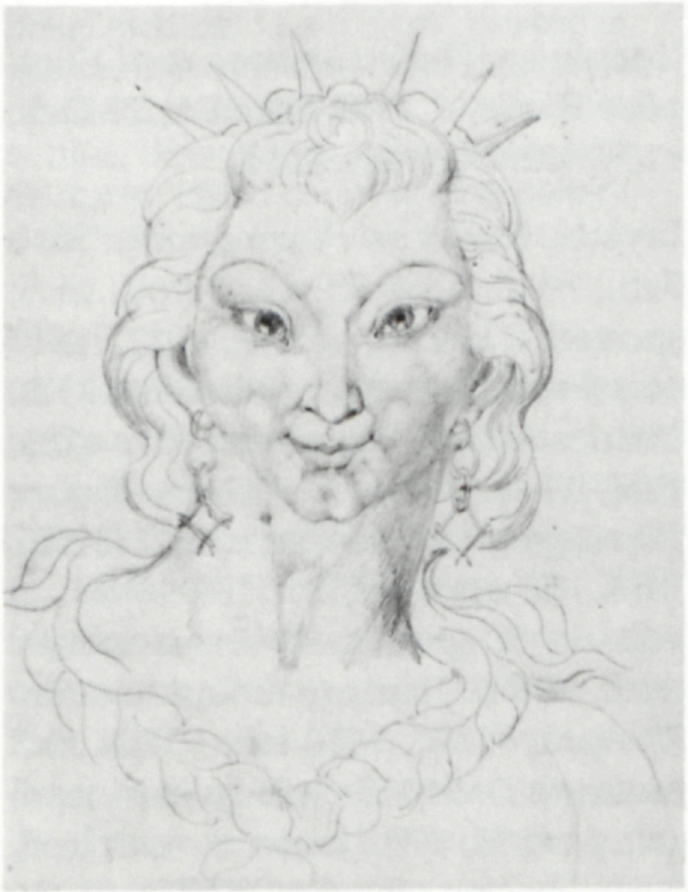
Scott, Poetical Works, 1782. Brick Row Book Shop, April cat. 17, #11, hinges cracked ($250).
Shakespeare, Dramatic Works, 9 vols., 1802. Walford, Feb. 1988 cat. A/326, #198, with Blake’s pl. (£500). Blackwell’s, March 1988 cat. A90, perhaps the copy earlier in their stock lacking Blake’s pl. (£2700). Pickering & Chatto, April cat. 102, #44, lacking 3 pls. (including Blake’s), fancy binding ($10,000). Clearly, this work increases in value as the number of pls. diminishes.
Stedman, Narrative, 1813. Walford, May 1988 cat. H/152, #321, pls. hand colored (£975); same copy and price, Aug. 1988 cat. A/328, #83.
Stuart and Revett, Antiquities of Athens. Charles Wood, June cat. 68, #407, 5 vols., 1762-1830, “light blind-stamp in blank margin of each plate” ($7500). Marlborough, Sept. cat. 135, #33, 4 vols., 1762-1816, internally very clean (£4000).
Varley, Treatise on Zodiacal Physiognomy, 1828. Quaritch, May cat. 1104, #12, stitched without binding, uncut, washed, some margins repaired, top half of pl. 3 (“Ghost of a Flea”) illus. ($4500).
Young, Night Thoughts, 1797, uncolored. CNY, 21 Feb., #1707, top edge gilt, others uncut, few stains, lacking the explanation leaf, p. 24 illus. ($4950). Traylen, April cat. 104, #591, with the explanation leaf, edges trimmed and gilt (with some loss of imprints and design margins?), fancy binding (£4500). CNY, 17 May, #20, top edge gilt, others uncut, some foxing, p. 55 with repaired tear, with the explanation leaf ($5280 on an estimate of $1500-2000); same copy, Bromer Booksellers, July cat. 55, #8, p. 80 illus. ($8500). Chelsea Rare Books, Sept. private offer, lacking the explanation leaf, rare 1st published st. of the title page to Night the First (£2000).
Young, Night Thoughts, 1797, colored. SL, 1 June, #208, lacking the explanation
INTERESTING BLAKEANA
Chaucer, Works, ed. Speght, 1687. Heritage Book Shop, Nov. private offer, rebacked ($1250). For a cogent argument that this was the ed. used by Blake, see A. S. Gourlay, “What Was Blake’s Chaucer?” Studies in Bibliography 42 (1989): 272-83.
Chapman, trans., Iliads, c. 1611, and Odysses, c. 1614, of Homer. CL, 24 May, #163 (Maggs for Essick, £1430). See illus. 17 and its caption for an explanation of why this book is listed here.
Gilchrist, Life of Blake, 2 vols., 1880. Pickering and Chatto, Nov. cat. 678, #164, with light blue-green dust wrappers bearing Frederic Shields’s adaptation of Robert Blake’s design also gilt stamped on the cloth covers ($850). This is the first notice I can recall indicating that the 1880 Gilchrist was issued with pictorial dust wrappers. For the Shields design, see Blake Newsletter 8 (summer-fall 1974): front and back covers.
Hayley, auction cat. of his library, Evans, 13 Feb. 1821 and 12 following days. BBA, 2 Feb., #389 (Burmester, £374 on an estimate of £50-75); same copy, Ximenes, Aug. cat. 85, #21 ($1250); acquired Sept. by J. La Belle. Apparently the only known copy fully annotated with prices and purchasers.
Keynes, autograph notebook, 2 vols., 152 pp., c. 1945-50, including comments on Blake’s illuminated books and the founding of the Blake Trust. Jeremy Norman, May cat. 19, #273, 1 p. illus. ($1250). This Norman cat. of materials from the collection of K. Garth Huston offered a considerable amount of Keynesiana, including a bronze head of Sir Geoffrey by Nigel Booham (#307, illus., with a smaller bronze bust, $14,500).
Yeats, autograph manuscript journal, 11 July 1898-31 March 1902, including a brief entry describing a dream about a book that “contained lost poems by Blake” (from the journal, as quoted in the auction catalogue). CNY, 10 Nov., #201, 2 pp. illus. (not sold).
BLAKE’S CIRCLE & FOLLOWERS
Works are listed under artists’ names in the following order: untitled paintings and drawings sold in groups, single paintings and drawings, letters and manuscripts, separate plates, books by (or with plates by or after) the artist.
BARRY, JAMES
“King Lear,” lithograph, 1803. Garton European Prints, Sept. cat., #6, with the aquatint border, illus. (£7500).
A Letter to the Dilettanti Society, 1799. Sanders, Feb. cat. 114, #25, extra-illus. with 3 pls., rebacked (£150).
BASIRE, JAMES
Archaeologia. BBA, 26 Oct., #251, vols. 1-107, 1770-1982, a complete run, worn (Princeton Rare Books, £1540).
CALVERT, EDWARD
“The Brook,” wood engraving. Weston Gallery, April cat. 2, #127, from the Memoir, illus. ($745).
“Cyder Feast,” wood engraving. Weston Gallery, April cat. 2, #126, from the Memoir, illus. ($1180).
“The Ploughman,” wood engraving. Weston Gallery, April cat. 2, #125, from begin page 232 | ↑ back to top
“Return Home,” wood engraving. Weston Gallery, April cat. 2, #128, from the Memoir, illus. ($745). SL, 20 April, #111, trimmed to image, from the Memoir (not sold).
CUMBERLAND, GEORGE
A large collection of his drawings and water colors, CL, 11 July, #22-48, 18 illus., 2 in color (£396-2200, several lots not sold). All are landscapes without Blakean qualities in design or execution.
FLAXMAN, JOHN
See also Flaxman under Letterpress Books, above.
Angels Gathered around a Book. Pen and gray wash over pencil, 32.5 × 40.5 cm. Acquired in recent years as a Flaxman drawing from a German collection by Heim Gallery and Christopher Powney; sold by Powney as a Flaxman to Colnaghi’s London; offered Feb. by Colnaghi’s New York as a Blake drawing ($50,000). Illus., attributed to Blake, and dated c. 1785 in Martin Butlin, “Six New Early Drawings by William Blake and a Reattribution,” Blake 23 (1989): 107-12. I believe that this drawing is by Flaxman. It is too accomplished, in its sweet and delicate evocation of Renaissance face and figure types, to be by Blake. Detlef Dörrbecker has suggested that William Young Ottley might be the author of this or some of the other “Blake” drawings listed here under Flaxman.
Cypress Trees on Monte Mario, attributed to Flaxman. Pen and ink, 17.5 × 10.8 cm. Agnew’s, Feb.-March cat. of water colors, #27 (£550).
Design for a Monument: A Seated Youth Clasping a Tablet. Pen and wash over pencil, 13.6 × 14.5 cm. Sold as a Flaxman, CL, 17 Nov. 1987, #2, with Three Children round a Fire (see below), also attributed to Flaxman (Christopher Powney, £220). Sold as a Flaxman in 1988 by Powney to a British private collector. Illus., attributed to Blake, and dated c. 1785 in Martin Butlin, “Six New Early Drawings by William Blake and a Reattribution,” Blake 23 (1989): 107-12. This drawing seems to me altogether typical of Flaxman’s work.
Hesiod designs, pl. 32, a drawing for. Acquired March by R. Essick from Christopher Powney. See illus. 18.
Pleiades. CL, 11 July, #16 (Christopher Powney, £176). Acquired Sept. from Powney by R. Essick, who gave it to J. La Belle in Nov. See illus. 19.
Roman Family. Pen and gray ink, gray wash, 23.5 × 14.8 cm. Acquired March by R. Essick from Christopher Powney.
Study for a Monument to a Judge. Pencil, pen and gray ink, gray wash, 8 ½ × 5 ¾ in. CL, 11 July, #97 (£418).
Study of a Man Seated, Embracing Children, and Study of a Woman Holding a Baby. Pencil, pen and gray ink, wash, 7 ⅜ × 5 ⅞ in. and 6 ¼ × 3 ⅛ in. CL, 11 July, #17 (£550).
Three Children round a Fire. Ink and gray wash over pencil, 14.4 × 19.1 cm. From the collection of Maria Denman, Flaxman’s sister-in-law, acquired 1987 by Christopher Powney (see Design for a Monument, above) and sold by him to Agnew’s as a Flaxman drawing. Offered Agnew’s, Feb.-March cat. of water colors, #22, attributed to Blake, illus. (£16,000). Acquired Feb. by an English lord. Illus., and again attributed to Blake and dated c. 1785, in Martin Butlin, “Six New Early Drawings by William Blake and a Reattribution,” Blake 23 (1989): 107-12. Nothing in this loose drawing suggests Blake’s hand to me. The face of the central boy is particularly uncharacteristic. I believe that this drawing is probably, but not certainly, by Flaxman.
Wilson Lowry. Portrait sketch, pencil, 6 ½ × 5 ¾ in. Christopher Powney, Oct. private offer ($1300).
Aeschylus illustrations, 1795. Book Press, Dec. cat. 48, #240, original wrappers ($300).
Anatomical Studies, 1833. Walford, Dec. 1988 cat. A/330, #189 (£110). Swann, 2 Feb., #112, foxed, worn ($110). Michael Phelps, Feb. cat. 33, #68, original cloth worn (£195).
Dante illustrations. Zisska, 3-5 May 1988 auction, #1660, Rome 1802 ed. (DM 460). Robert Clark, Feb. cat. 15, #224, London 1807 ed., some browning (£90).
Hesiod illustrations. Erasmushaus, April cat. 858, #81, with the Aeschylus designs, both pub. del Vecchio, n.d. (SwF 650).
Iliad illustrations, Rome, 1793. Erasmushaus, April cat. 858, #80 (SwF 380).
Lectures on Sculpture. Dawson, Feb. cat. 28, #489, 1838 ed., contemporary calf (£140); same copy and price, Oct. cat. 29, #152. Swann, 2 Feb., #114, 1829 ed., foxed ($77). Robert Clark, May cat. 16, #203, 1838 ed., original cloth (£60). BBA, 8 June, #333, 1829 ed., pls. spotted (Galton, £22). Philadelphia Rare Books, Nov. cat. 5, #90, 1829 ed., modern binding, lacking begin page 233 | ↑ back to top frontispiece ($200—rather dear for an incomplete copy).
Milton, Latin and Italian Poems. Blackwell’s, summer 1988 cat. “Edgar,” #31, 1808 ed. (£135). BBA, 23 Nov., #181, 1801 ed., with 3 unrelated works (Axe, £38).
Odyssey illustrations. Swann, Feb. 2, #113, with the Aeschylus illustrations, both with Italian text, n.d. ($77).
FUSELI, HENRY
Agave, Ino and Autonoe Emerge from their Dionysian Rapture and Are Informed
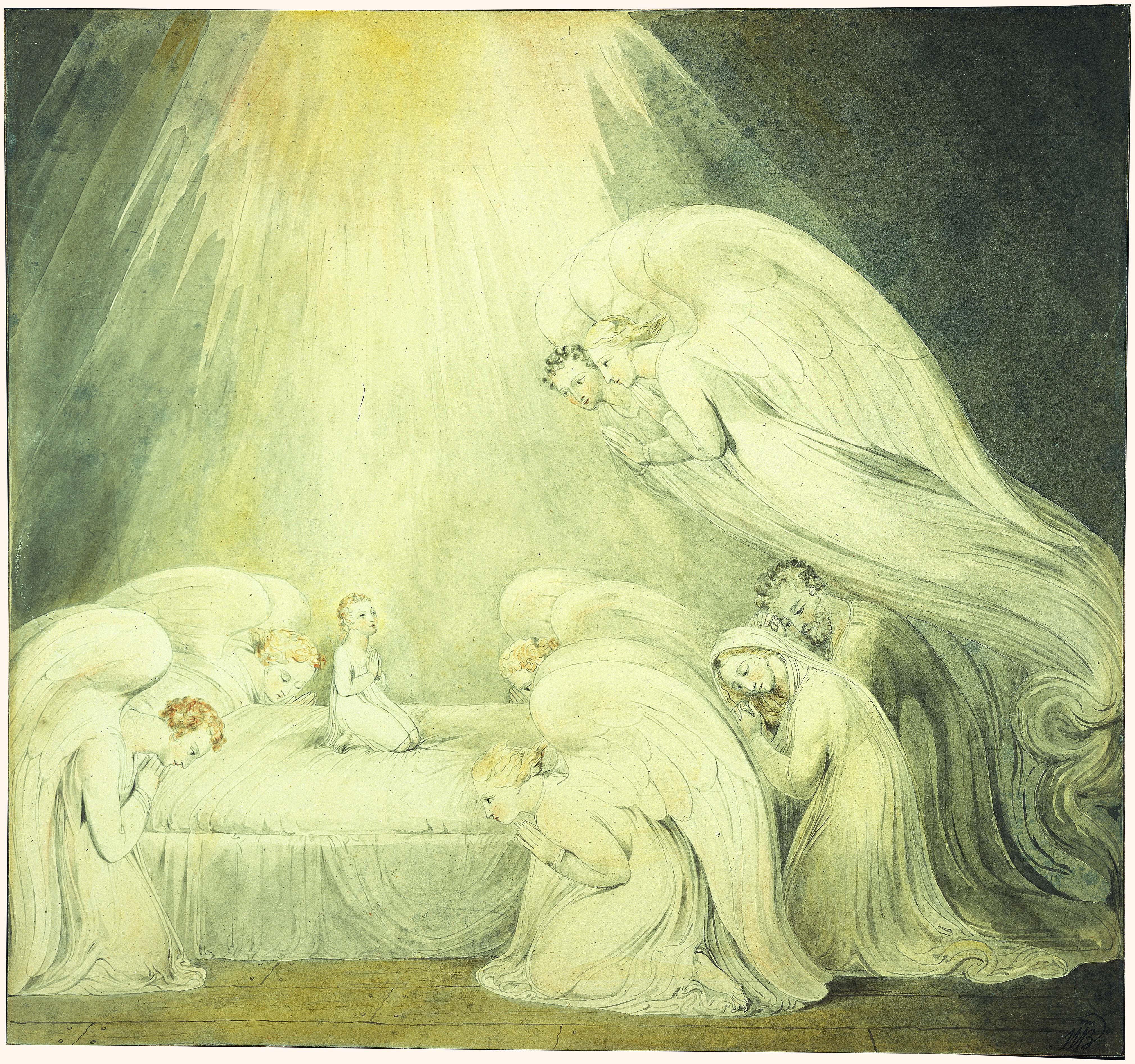
[View this object in the William Blake Archive]
Birth of Sin. Oil, 142 × 117.2 cm. A recently rediscovered painting from Fuseli’s Milton Gallery of 1799. CL, 14 April, #90, illus. color (not sold on a brave estimate of £100,000-120,000).
Prince Arthur’s Vision, drawing after Fuseli by Peltro William Tomkins in preparation for his engraving. Pencil with red chalk, 43.5 × 34.5 cm. SL, 13 July, #26 (not sold).
Study of a Nude Male. Pen and ink, 19 × 13 cm., c. 1795. SL, 9 March, #32, illus. (not sold; estimate £6000-8000).
Study of Mrs. Fuseli Wearing an Elaborate Hat. Pen, pencil, gray wash, 21.5 × 13.5 cm. SL, 13 July, #85, illus. (£7700).
A collection of c. 100 autograph letters by artists, including Fuseli, Flaxman, Linnell, Richmond, Boydell about his Shakespeare Gallery, and Opie on Barry’s lectures. SL, 20 July, #454 (Rye, £3410). begin page 234 | ↑ back to top Receipt signed, 20 April 1805, part payment for his illustrations to Sotheby’s Oberon, pub. by Cadell and Davies, 1805. BBA, 22 June, #300 (Weinglass, £187).
20 engravings after Fuseli, C. & J. Goodfriend, Aug. private offer. Prices ranged from $3000 for the pair of Midsummer Night’s Dream illustrations from Boydell’s Shakespeare Gallery to $75 for book illustrations. The group included a fine impression of J. R. Smith’s mezzotint of “Lear and Cordelia” ($950) and several separate pls. engraved by Moses Haughton: “Nursery of Shakespeare” ($400), “Dismission of Adam and Eve from Paradise” ($850), “Adam Resolved to Share the Fate of Eve” ($850), and “Sin Pursued by Death,” marginal tear and stains ($500).
“O Evening thou Bringest All,” lithograph, 1802. Garton European Prints, Sept. cat., #5, 1st st. with the aquatint border, illus. (£12,500—a record asking price).
“Sleeping Woman with a Cupid,” drypoint, c. 1780-90. Christopher Mendez, Sept. private offer, printed in brown, scuffed and laid down, with the collection stamp of Sir Thomas Lawrence (£500).
Boothby, Sorrows, 1796. Swann, 25 May, #60 ($154).
Boydell, Collection of Prints . . . Illustrating . . . Shakspeare, 1803. CL, 16 May, #128, 2 Fuseli pls. only, illustrating Midsummer Night’s Dream, marginal repairs (£308); #129, 4 Fuseli pls. only (Macbeth, King Lear, Henry V, Tempest), minor repairs (£418).
Cowper, Poems, 1808. Phillip Pirages, June cat. 15, #442, fancy binding ($300).
Lectures on Painting. Quaritch, May cat. 1105, #39, second series, 1830 ($200); #41, 1820 ed. ($200).
Gray, Poems, 1801. Simon Finch, March cat. 5, #118, uncut in original boards, soiled (£45).
Homer, Iliad and Odyssey. Claude Cox, Jan. cat. 70, #20, Iliad only, 1813, 3 vols., some pls. browned, fancy binding (£35). Ursus Books, Nov. cat., #55, Iliad, 1813, with Odyssey, a mixed set of the 1806 small paper issue and 1813, all with the pls. in the 2nd st., 12 vols., contemporary red morocco ($1500).
Milton, Paradise Lost, 2 vols., 1802. W. & V. Dailey, Nov. private offer, damaged, spines broken and covered with decayed cellotape, 2 covers loose, cellotape repairs of a few pages, pls. badly foxed and ink-stained in the margins, otherwise fine ($50).
Pope, Rape of the Lock, 1801. James Burmester, April cat. 9, #382, lacking half-title (£38).
Winkelmann, Reflections, trans. Fuseli, 1765. Quaritch, May cat. 1105, #115 ($650). Marlborough, July cat. 41, #218, worn, some foxing (£175).
Young, Catalogue of the Celebrated Collection of. . .Angerstein, 1829. BBA, 11 May, #315, with Young, Catalogue of the Pictures. . .in the Possession of. . .Leicester, 1825, and 3 unrelated vols. (Barker, £88).
LINNELL, JOHN
See illus. 17.
Changing Pastures. Water color, 12.5 × 19 cm., signed. SL, 9 March, #112, illus. (£1045).
Country Road. Oil, 70 × 99 cm., signed and dated 1864. CL, 14 April, #50, illus. color (not sold on an optimistic estimate of £20,000-25,000).
David and the Lion. Oil, 139.7 × 218.4 cm., signed and dated 1850. CL, 17 Nov., #126, illus. color (not sold; estimate £6000-8000).
Figures by a River Bank. Pen and brown ink, 16.5 × 20.5 cm., initialed. SL, 25 Jan., #107, illus. (£550).
Portrait of Frederick Tatham. Pencil, size not recorded. Acquired 1987 by the Fitzwilliam Museum, gift of R. M. M. Pryor. Illus. in Annual Report of the Syndicate and Friends of the Fitzwilliam (1987), pl. 7.
Portrait of John Davies Gilbert. Oil, 44.5 × 35.5 cm., signed and dated 1834. SL, 15 Feb., #297, illus. (£2200).
Shepherd’s Love Song. Oil, 76 × 102 cm., signed and dated 1827. SL, 22 March, #160, illus. (£2750).
Sketch of Sunset. Water color, 6 ¼ × 9 ¼ in., signed. Martyn Gregory, Oct. cat. 54, #80, illus. (£1600).
Study of Sky and Clouds. Water color, 9 × 11 ¼ in., signed and dated “Augt 29/[18]63.” Martyn Gregory, Oct. cat. 54, #79, illus. (£1450).
Wooded Landscape with Windmill. Oil, 17.6 × 28.5 cm. CL, 26 May, #54 (£1100).
“Sheep at Noon,” etching. SL, 27 June, #231, on thin Japan, illus. (not sold on an estimate of £800-1200).
MORTIMER, JOHN HAMILTON
Group Portrait of Sargeant-at-Arms Bonfoy, His Son, and J. Clemenston. Oil, 101.6 × 127 cm. CL, 17 Nov., #17, begin page 235 | ↑ back to top illus. color (£55,000—a record for a work by Mortimer?).
Studies of Architectural Decorations. Pencil, pen, gray ink and gray wash, sheet 6 ½ × 4 ⅜ in. CL, 11 July, #18, illus. (£1100).
Study for the Presentation of the Magna Carta to King John. Pen and ink, gray washes, 20.5 × 26 cm. SL, 13 July, #21 (not sold).
Etchings Dedicated to Reynolds, 1778-80. Weston Gallery, April cat. 2, #30, “Musical Monster,” #31, “Enraged Monster,” #32, “Revengeful Monster,” #33, “Sleeping Monster,” all 1816 printings, all illus. ($220 each).
Shakespeare Characters, etchings. Weston Gallery, April cat. 2, #27, 1st (1775) series of 6 pls., 1816 printing, all illus. ($1750); #28, “Cassandra,” and #29, “Shylock,” from the 2nd (1776) series, both illus. ($265 each).
Camoens, Luciad, 1778 (frontispiece by Mortimer). Christopher Mendez, Sept. private offer (£50).
PALMER, SAMUEL
The Brothers, Guided by the Attendant Spirit, Discover the Palace and Bowers of Comus. Water color, 53 × 75 cm., exhibited 1856. Leslie Hindman auction, Chicago, 14 Oct., #10, from the William J. Stoecker collection, illus. color (Donald Heald, $170,000). Previously sold SL, 19 Nov. 1987, #144 (£55,000).
Florence and the Val d’Arno from the Cypress Grove of San Miniato. Water color, 12 ⅝ × 21 ⅜ in., signed. CL, 14 Nov., #150, illus. color (not sold on an estimate of £25,000-35,000). A previously untraced work first exhibited in 1845.
Landscape with Sheep in Kent. Oil, 19.2 × 41.6 cm. CL, 17 Nov., #24, illus. color (£77,000).
“Bellman,” etching. CL, 12 April, #357, 7th st., illus. (£1540).
“Cypress Grove,” etching. Weston Gallery, April cat. 2, #122, final st., illus. ($315).
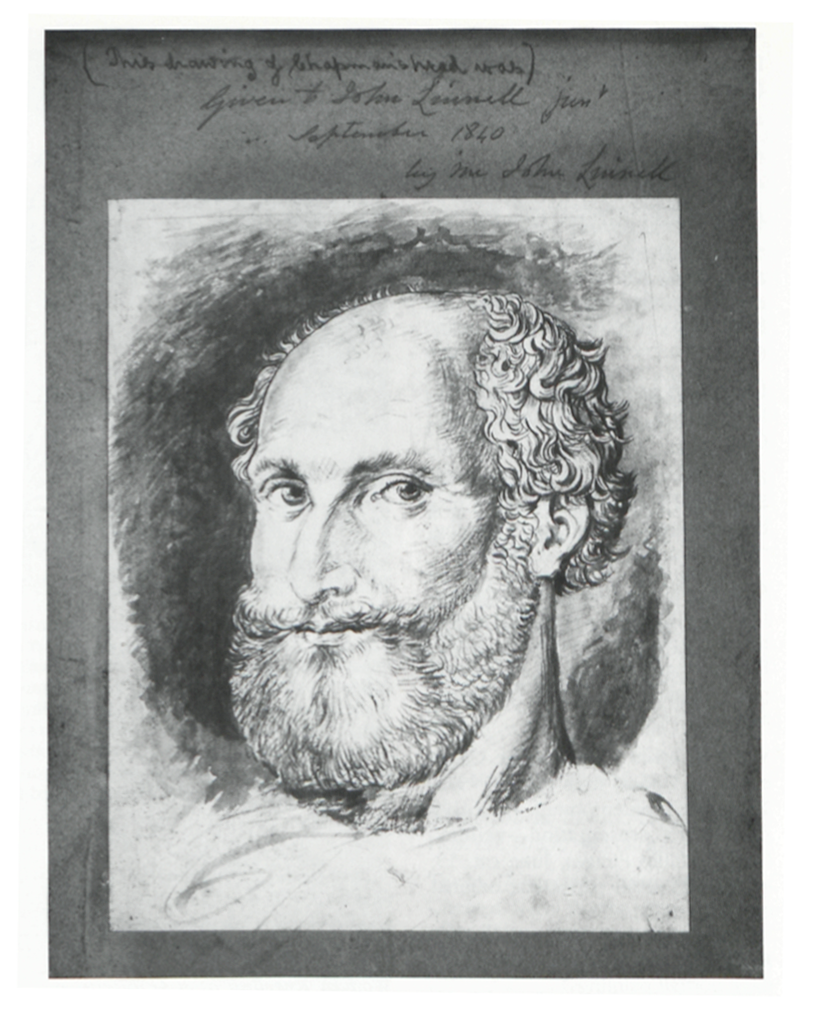
“Early Ploughman,” etching. Weston Gallery, April cat. 2, #121, 5th st., illus. ($1050). CL, 12 April, #356, 4th st., with 3 pls. by other artists (£275).
“Herdsman’s Cottage,” etching. Weston Gallery, April cat. 2, #118, 2nd st., illus. ($875).
“Moeris and Galatea,” etching. Weston Gallery, April cat. 2, #124, final st., illus. ($220).
“Opening the Fold,” etching. SL, 27 June, #249, between 4th and 5th st., pencil signature, illus. (£1210).
begin page 236 | ↑ back to top“Rising Moon,” etching. Weston Gallery, April cat. 2, #120, 7th st., illus. ($1485).
“Sepulchre,” etching. Weston Gallery, April cat. 2, #123, final st., illus. ($200).
“Skylark,” etching. Weston Gallery, April cat. 2, #117, 7th st., illus. ($1750).
“Sleeping Shepherd,” etching. Garton & Co., April cat. 46, #24, 4th st., good impression, illus. (£1100). Weston Gallery, April cat. 2, #119, 4th st., illus. ($1925).
Dickens, Pictures from Italy, 1846. Traylen, Sept. cat. 105, #785, original cloth (£120).
Hamerton, Etching & Etchers, 1868. Swann, 14 Sept. #142, lacking 3 pls., but apparently with Palmer’s etching, “Early Ploughman,” 4th st. ($468).
Milton, Shorter Poems, 1889. Maggs, Jan. cat. 1091, #561, small paper, original cloth, pls. foxed in margins (£200). Phillip Pirages, June cat. 15, #724, small paper, original cloth ($300); same copy and price, Nov. cat. 16, #368.
Virgil, Eclogues, trans. Palmer. Chaucer Head Books, June cat. 10, #526, 1884 ed., “contemporary—probably publisher’s presentation—vellum” (£550). Phillip Pirages, June cat. 15, #725, 1883 small paper ed., original cloth, foxed ($1400).
ROMNEY, GEORGE (excluding most portrait paintings)
Anger, Envy and Fear personified. Pen and brown ink, 7 ½ × 11 in. CL, 14 Nov., #61, illus. (£550).
Portrait of Emma Hamilton as Sensibility. Oil, 150 × 121.5 cm., painted c. 1786 and acquired by William Hayley (see his Life of Romney [1809] 120-21). SL, 8 March, #50, illus. color (£30,800).
Studies for Sisters Contemplating on Mortality. 6 drawings, pencil and/or pen and brown ink, 6 × 8 ⅛ in. and smaller. CL, 11 July, #11 (not sold).
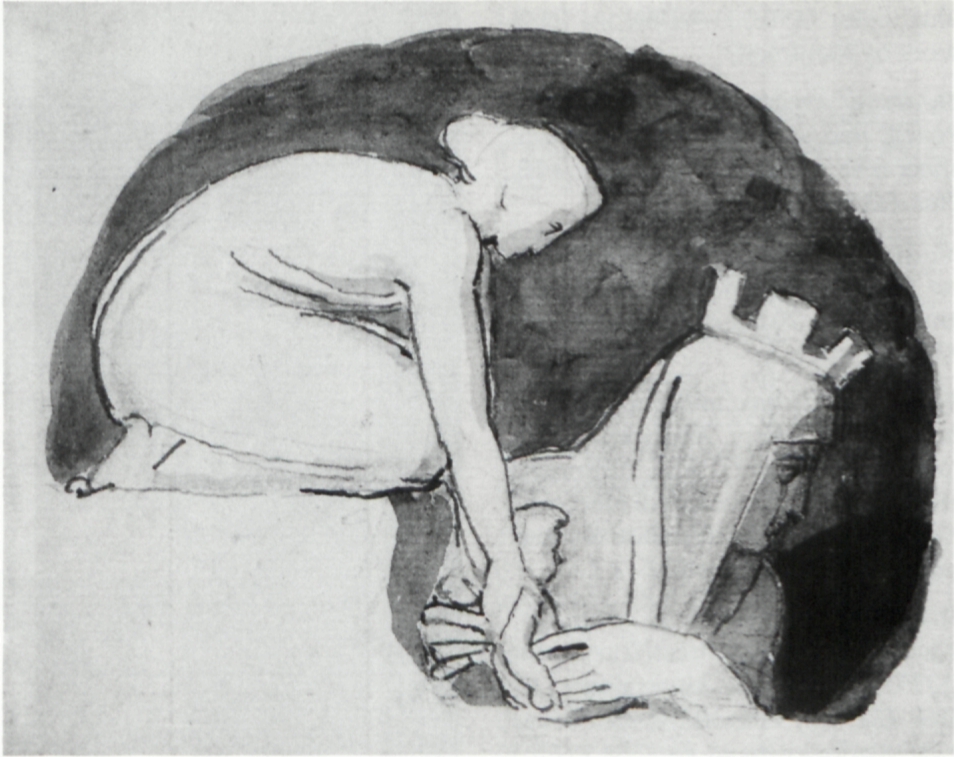
Studies for Tancred and Erminia. 6 pen and brown ink drawings, 7 ¾ × 6 ¼ in. CL, 11 July, #9 (£220).
Woman Kneeling at a Fountain, a Child Standing Beside Her. Pencil, pen and ink, brown wash 12 ⅝ × 9 ⅞ in. CL, 14 Nov., #60, illus. (£3850).
SHERMAN, WELBY
“Shepherd,” engraving after Palmer, 1828. CL, 12 April, #395, on laid India, slightly foxed, surface dirt, but only the 4th known impression, illus. (£2860 on an estimate of £800-1200). Same impression, Garton European Prints, Sept. cat., #9, illus. (“Sold”).
STOTHARD, THOMAS
Alfred Disguised as a Harper and 11 other drawings, including studies for Pilgrim’s Progress. Pencil or pen and ink, 4 with wash, 7 ¼ × 9 ⅞ in. and smaller. CL, 11 July, #15 (£286).
“The Lost Apple,” lithograph, 1803. Garton European Prints, Sept. cat., #2, 2nd st.?, with aquatint border, illus. (£2000).
Aesop, Fables, 1793. Sotheran’s, summer 1988 cat. 1003, #2, 2 vols. (£425).
Bijou, 1828. Claude Cox, Nov. cat. 75, #182a, original boards, rubbed (£30); #182b, another copy, lacking 1 (non-Stothard) pl. (£15).
begin page 237 | ↑ back to topBray, Life of Stothard, 1851, extra-illus. copies only. SL, 13 July, #845, with 97 added pls., 2 vols. (Montague, £198).
Byron, Works, 2 vols., 1815. Simon Finch, May cat. 6, #83, 10 (of 12) pls., fancy binding illus. (£475).
Catullus, Tibullus et Propertius, 1801. Sanders, Jan. 1988 cat. 113, #467 (£25).
Cervantes, Don Quixote, 1801. Claude Cox, Jan. cat. 70, #68, 4 vols., fancy binding (£120).
Cowper, Poems, 1800. Deighton, Bell, Sept. private offer, large paper, contemporary calf (£175).
Defoe, Robinson Crusoe, 1790. Heritage Book Shop, Jan. cat. 173, #33, the
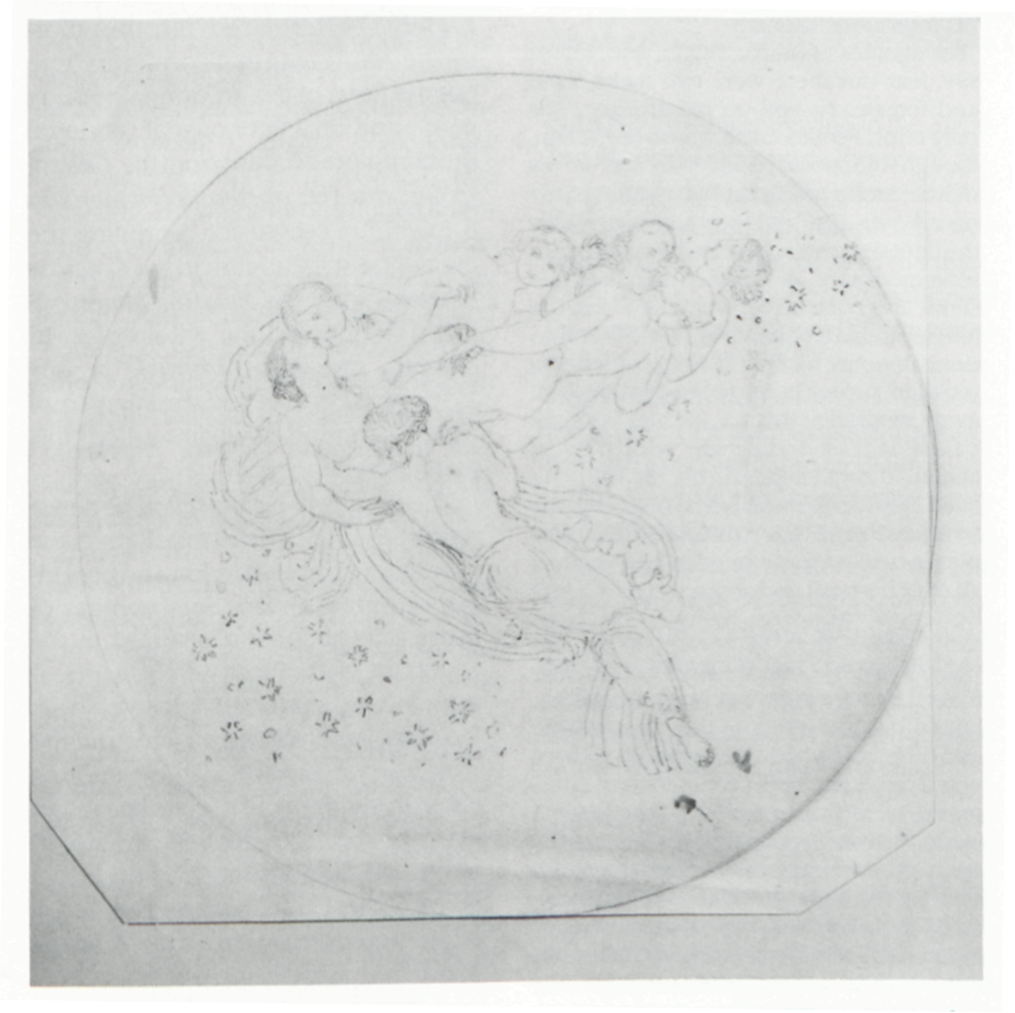
Dryden, Fables, 1806. W. & V. Dailey, Oct. private offer ($75).
Fenelon, Adventures of Telemachus, 1795. Ann Creed Books, Feb. cat. 1, #319, 2 vols., rubbed, some foxing (£125). Vanbrugh Books, Sept. private offer, clean copy (£75).
Gessner, Works, 1802. Jarndyce, April cat. 62, #84, 3 vols. (£48).
Hayley, Triumphs of Temper, 1788. James Burmester, April cat. 9, #365 (£38). Blackwell’s, Oct. English Literature cat., #30 (£30).
Literary Souvenir, 1828. Rota, Sept. private offer (£30).
Pinkerton, Rimes, 1782. Ximenes, Aug. cat. 85, #325 ($150).
Rogers, Italy. Phillip Pirages, June cat. 15, #449, 1859 ed., fancy binding ($150). Quaritch, Sept. private offer, eds. of 1824 (pt. 1) and 1828 (pt. 2) in 1 vol., presentation inscription by Rogers, with a letter by Rogers and a portrait sketch of him inserted ($250)—the presence of 6 of Luke Clennell’s wood engravings after Stothard in these 2 eds. has not been previously noted. Sanders, Sept. private offer, 1830 ed., original boards, cloth folding case (£85). Bickersteth, Nov. cat. 108, #217, 1830 ed. (£35).
Rogers, Pleasures of Memory, 1801. Rota, Sept. private offer (£25).
Rogers, Poems. BBA, 22 June, #388, 1834 ed. (not sold); 13 July, #145, 1814 ed. (Whetman, £22). Sanders, Sept. private offers, 1827 ed. (with Clennell’s wood engravings), original boards (£8.50); 1834 ed., original boards, cloth folding case (£85). Claude Cox, Nov. cat. 75, #13, 1812 ed. (£28). Bickersteth, Nov. cat. 108, #216, 1834 ed. (£35).
Sterne, Works, 10 vols., 1798. Walford, Nov. cat. H/159, #85 (£195).
Tasso, Jerusalem Delivered, 1797. Chelsea Rare Books, Sept. private offer, 2 vols., contemporary calf (£70).
Thomson, Seasons, 1793. Claude Cox, Jan. cat. 70, #34, fancy binding (£165).
Walton, Complete Angler, 1836. Sanders, Jan. 1988 cat. 113, #477, 478 (£48 each). Claude Cox, March cat. 71, #138, 2 vols. large paper (£110).
Walton, Lives of Donne, et al, 1827. Sanders, Jan. 1988 cat. 113, #475 (£30); #476, hinge repaired (£18).
Young, Night Thoughts, 1798. Claude Cox, Jan. cat. 70, #278, marginal browning (£40). Phillip Pirages, June cat. 15, #406, fancy binding ($450). Chelsea Rare Books, Sept. private offer (£95).

